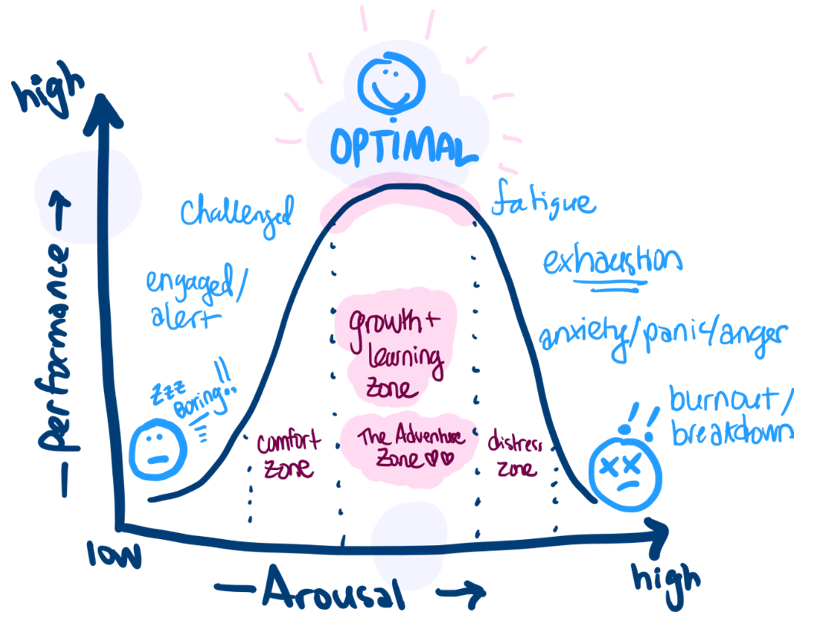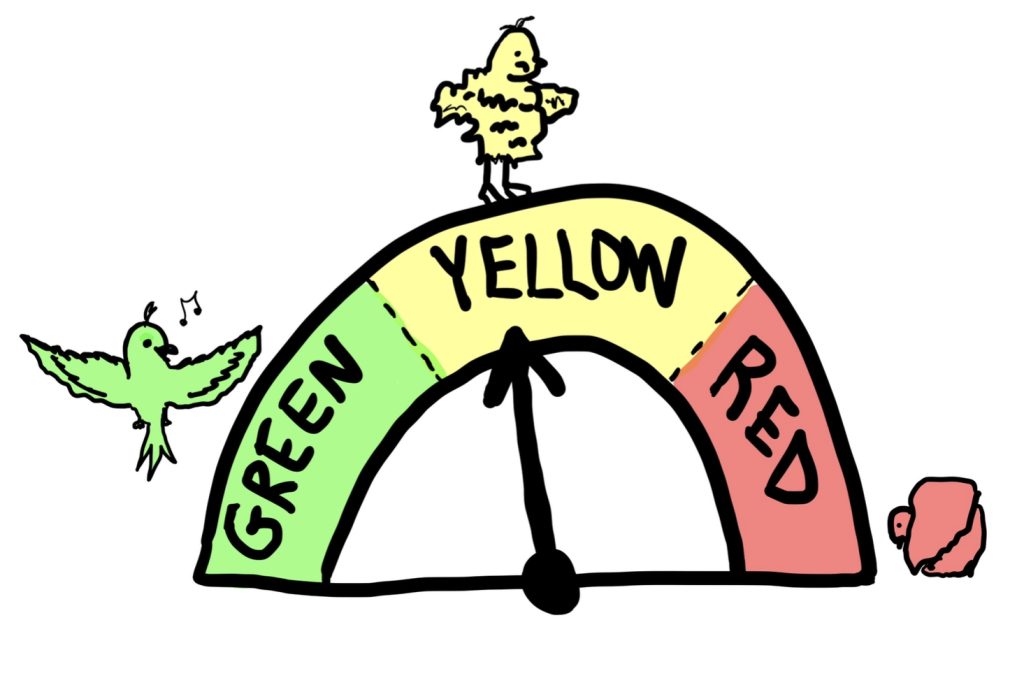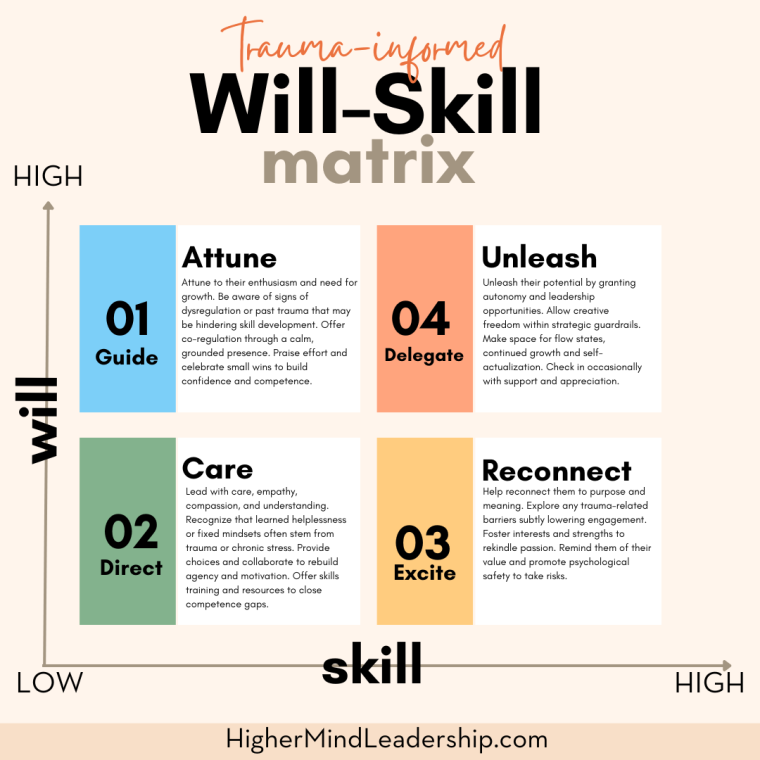The will/skill matrix is a popular leadership model that categorizes team members into four quadrants based on their willingness and ability to perform a task. However, evaluating someone’s skill and will on the surface doesn’t reveal the complex physiology and psychology below. By understanding trauma, chronic stress, and polyvagal theory, leaders can apply the matrix with greater wisdom and compassion.
Quadrant 1 (High Will, Low Skill) Attune
This person has enthusiasm and desire to learn but lacks skills. Attune to their eagerness while assessing for signs of dysregulation that may be hindering competence. Offer co-regulation through a calm, grounded presence. Praise effort and celebrate small wins to build confidence and skill. Think of the “Goldilocks Curve” when planning for growth.

TiQi leaders understand the Yerkes-Dodson Law of Arousal and do not overwork their teams or bore them to tears.
Quadrant 2: (Low Will, Low Skill) Care
This person resists using their full abilities. Lead with care, empathy, compassion and understanding. On the surface, this team member lacks both the motivation and competence to succeed. But peering below, we may see:
- Trauma physiology in hyperarousal – fight, flight, or freeze. The brain downgrades higher cognition.
- Hypoarousal from chronic stress, causing depression, disengagement, and cognitive impairment
- Learned helplessness from past failures or trauma. They believe they can’t succeed.
Recognize that learned helplessness or fixed mindsets often stem from the helpful/”helpfulness” of the brain to conserve energy. Past situations that proved expending this effort was fruitless, can lead to learning not to exert that precious energy. Additionally someone with trauma physiology, burnout physiology, and/or the physiology of chronic stress, may be exhibiting “low will” by the very nature or their behind-the-scenes nervous system state. Provide choices, context and the cues of safety and connection. Collaborate to first reclaim the physiology of safety and connection, and then rebuild motivation and engagement. Offer training and resources to support growth. Offer stories of inspiration, as the feeling on “inspired” in the body can help shift their inner world and also trigger motivation.




Click here for my polyvagal video series all in 1 page! (With a free PDF to boot!)
With compassion and empathy, we can create physiological and psychological safety to build new neural pathways and a growth mindset. Patience, co-regulation, and small wins can restore hope.
Quadrant 3: (High Skill, Low Will or Low Confidence) Reconnect
This person might have competence but be doubting themselves. Help reconnect them to purpose and meaning. Be on the lookout for any trauma-related barriers subtly lowering confidence. Additionally be on the lookout for assumed constraints (aka limiting beliefs, constraining ideas). Foster strengths and interests to rekindle passion. Remind them of their value and promote psychological safety. The “low will” can also be related to trauma physiology, the physiology of stress, and/or burnout physiology. What may be happening below the surface?
- Anxiety about failure or letting people down, so they self-sabotage
- Burnout causing cynicism, disillusionment, and depleted self-care reserves
- Deep-rooted insecurity or negative self-talk impairing self-efficacy
- Chronic stress
- Trauma physiology

Quadrant 4: Unleash
This employee has strong skills and motivation. Unleash their potential by granting autonomy and leadership opportunities. Allow creative freedom within strategic guardrails. Make space for flow states, growth and self-actualization. Check in occasionally with support and appreciation.
This employee has both motivation and skill. Yet staying here requires:
- Ongoing learning and challenges to prevent boredom
- Work-life balance and stress recovery to prevent burnout
- Self-care and emotional resourcing to buffer life’s challenges
TiQi leadership encourages tapping into one’s “Higher Mind,” where connection creativity, intuition, and higher-order thinking thrive, facilitating transcendence and peak performance. For connection to the superconscious, you may like the D.R.E.A.M. Coaching audio in the middle of this page (however, watch the explainer videos above the audio).
By checking our assumptions and looking below the surface with empathy, we can be a true leader to those we serve. There are always deeper layers underlying behavior. The will/skill matrix is just the starting point for supporting each person’s unique needs and nurturing their growth. With trauma-informed and polyvagal-wise leadership, we can create an environment where everyone can heal, thrive, and actualize their potential. By incorporating physiology-based principles of attunement, care, reconnection and unleashing potential, leaders can apply the skill/will matrix in a more holistic, trauma-informed way. This empowers teams while promoting well-being.
TiQi Leader Resources (Trauma-Informed, Quantum-Informed)
Meet your team where they are, and serve them.

Bookmark your favorite page:
